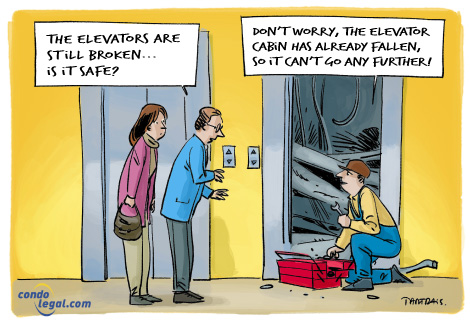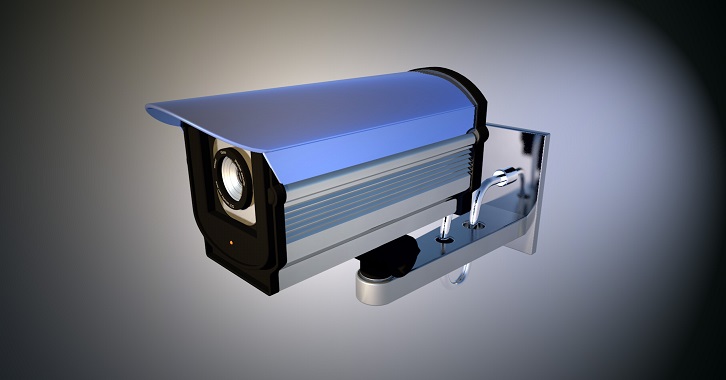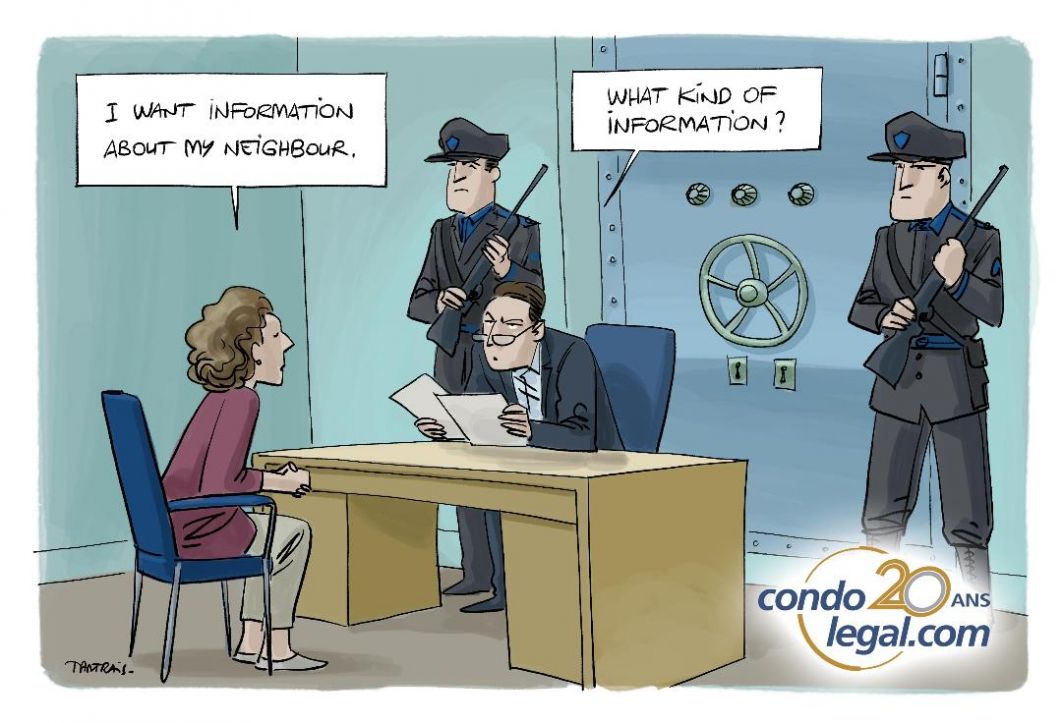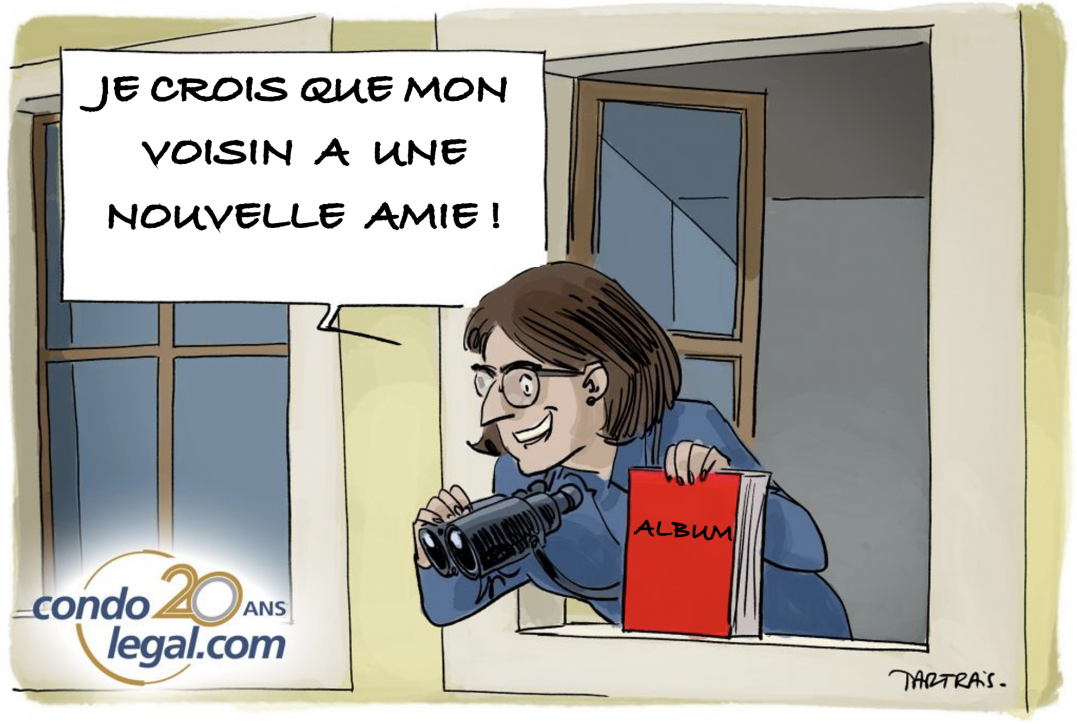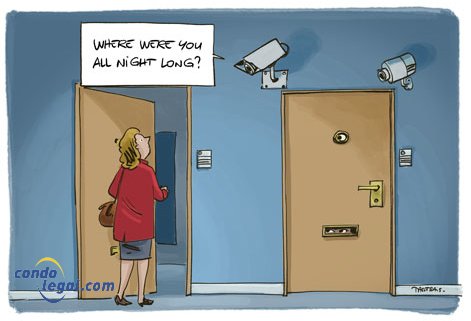
The desire to preserve the safety of people and property may lead both the syndicates and co-owners to consider installing surveillance cameras in the building. For many, when a co-ownership (condominium) faces repeated acts of vandalism or experiences burglaries, video surveillance is often seen as an effective solution, especially since the decrease in costs and technological advances have made it more accessible. However, the legality of installing cameras in co-ownerships raises several issues and sparks debates, particularly among residents concerned about preserving their right to respect of privacy.
Thus, several questions arise: Is the installation of surveillance cameras in co-ownerships legal? If so, is there a specific procedure to follow?
Syndicate
The Civil Code of Québec does not specifically regulate the installation of surveillance cameras in a divided co-ownership; a syndicate may be justified in installing such devices for the sole purpose of guaranteeing the safety of property and people. Surveillance cameras may be placed in common portions as long as they are not hidden and do not specifically target one or a few units or the residents themselves; nevertheless, these people must have been informed that the common portions are monitored by such technological devices otherwise the co-owners of the immovable could claim that it infringes on their privacy and so, according to section 36 of the Civil Code of Québec.
A justification and a decision are needed
The board of directors may take the initiative to have surveillance cameras installed in the common portions if there have been damages to the immovable in the past due to vandalism or theft and so, whether committed by third party members or occupants themselves; such an installation is explained by the mission of the syndicate to ensure the preservation of the immovable or operations of common interest.
However, if there have never been such misdeeds, some might claim that the installation of cameras constitutes work for improvement of the common portions; therefore, an authorization from the meeting of co-owners would be required under the terms of an enhanced majority vote. Moreover, in a judgement rendered by the Superior Court of Québec, it was decided that the notion of security being a component of the destination of the immovable, the installation of a better security system was part of the preservation of the destination of the immovable rather than changing that destination.
Respect of privacy
When a surveillance camera is installed in the common portions such as on different floor levels or in the front entrance of the immovable, occupants and visitors must be warned of its installation; a video surveillance warning sign should announce the use of such devices to those likely to be filmed and so, before they enter the premises. Although safety may be a valid reason, it would be inappropriate to install a surveillance camera pointing at the front door of a specific apartment; the Act respecting the protection of personal information in the private sector requires a syndicate of co-owners to reconcile its video surveillance needs with the individual's right to privacy which implies the right to live one's life free from the gaze of others. It should also be mentioned that the information gathered through video surveillance should only be used for the purposes for which the surveillance is conducted or for purposes authorized by law; thus, if a surveillance camera is installed in the co-ownership's interior garage for safety purposes, the information gathered can't be used to track the movements of the co-owners, occupants or lessees (tenants). However, in the case of car break-ins, the information may be communicated to the police.
Co-owner
A co-owner can't, on his own initiative, install a surveillance camera in the common portions; only the syndicate has the right and the power to hire a company in order to proceed with its setup and it is the same for the installation by a co-owner inside his private portion of a video surveillance system which aims to film the common portions accessible to all co-owners, this installation which may constitute a manifestly unlawful disturbance in that it would compromise in an intolerable matter the rights held by each of the co-owners in their free exercise of their rights amongst the common portions. In a judgement rendered by the Superior Court of Québec, it has already been recognized that photographing or filming a person in a private place or transmitting his image without his consent violates the reasonable expectation of residents in terms of privacy; such practice is contrary to sections 3 and 35 C.c.Q. which state that everyone has the right to the respect of privacy. Section 36 of the Civil Code of Québec adds that "The following acts, in particular, may be considered as invasions of the privacy of a person: (4) keeping his private life under observation by any means;".
Records management and their consultation
The installation of a surveillance camera system must meet a necessity; the objective pursued must be sufficiently significant to justify the collection of personal information and be proportionate to that purpose. Thus, no co-owner should have access to the viewing of the images collected; only few people designated by the board of directors such as a director, a condo manager or people responsible for the safety of the immovable should have access to it. Except to the police or judicial authorities in the event of an investigation requiring the examination of these images to identify the perpetrators of crimes or offences committed in the immovable, such recordings should under no circumstances be distributed or transferred to a third party.
Use of surveillance camera recordings
According to certain case law, the board of directors may use surveillance camera recordings to prove non-compliance with the declaration of co-ownership, provided that the right to privacy is respected. Indeed, a recent ruling established that common portions, such as the pool, terrace, and urban chalet, do not offer an expectation of privacy. However, the use of these recordings must be justified and proportionate, particularly for security reasons. The board of directors may thus review these recordings when it is necessary to enforce the declaration of co-ownership, as was the case when cigarette butts and ashes were found in a common portion, thereby justifying the use of images to identify the offenders.
However, courts emphasize that any evidence obtained in violation of fundamental rights, such as privacy, may be deemed inadmissible if it discredits the administration of justice. In the context of co-ownership, as long as the use of recordings is transparent and aimed at enforcing the declaration of co-ownership, they are generally accepted, provided that residents are informed of the presence of cameras.
A by-law is needed
In order to ensure the protection of privacy, a by-law governing the management of recordings and their consultation must be put in place; this regulation could thus include the following rules:
 WHAT YOU SHOULD KNOW! The decision to install surveillance cameras in a co-ownership must take into account several factors; it is a delicate balance that must be established between the rights of the community and those of the co-owners taken individually and this, according to the particular context of the concerned co-ownership.
WHAT YOU SHOULD KNOW! The decision to install surveillance cameras in a co-ownership must take into account several factors; it is a delicate balance that must be established between the rights of the community and those of the co-owners taken individually and this, according to the particular context of the concerned co-ownership.
 WHAT TO KEEP IN MIND: The safety of property and people is a component of the destination of the immovable; therefore, the installation of a security system is part of the preservation of the destination of the immovable rather than changing of it.
WHAT TO KEEP IN MIND: The safety of property and people is a component of the destination of the immovable; therefore, the installation of a security system is part of the preservation of the destination of the immovable rather than changing of it.
 WARNING! Installing surveillance cameras to enhance the safety of co-owners and their property must be carefully managed. Such a decision, as highlighted in the case of Boivin c. Syndicat des copropriétaires Terrasse Les Jardins Durocher inc., requires a majority vote, respect for privacy rights, and compliance with the destination of the immovable.
WARNING! Installing surveillance cameras to enhance the safety of co-owners and their property must be carefully managed. Such a decision, as highlighted in the case of Boivin c. Syndicat des copropriétaires Terrasse Les Jardins Durocher inc., requires a majority vote, respect for privacy rights, and compliance with the destination of the immovable.

